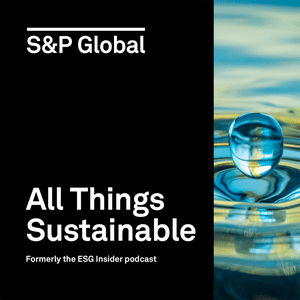CSO Insights: Singapore’s biggest bank on the ‘business imperative’ of climate action
In this episode of the All Things Sustainable podcast, we're talking to Helge Muenkel, Group Chief Sustainability Officer at Singapore’s biggest bank, DBS. The interview is the latest installment in our CSO Insights series, where we hear from Chief Sustainability Officers around the world about how they’re navigating the evolving sustainability landscape. "Big picture on climate action very specifically, the train has really left the station," Helge says of the bank's large corporate clients. "More and more customers are really seeing the transformation that is happening in our economies as a business imperative and are embracing it." Helge explains how DBS integrates environmental and social factors into its sustainability strategy. He says climate financing continues to present big financing risks and opportunities, and points to an increasing focus on scaling blended finance. Helge tells us that nature is also becoming an increasing focus for the bank — which echoes what we’ve heard from other sustainability leaders at Southeast Asian financial institutions in recent episodes. Listen to our interview with big Singapore-based bank UOB here: CSO Insights: How sustainability pullback is playing out in Southeast Asia Listen to our interview with big Malaysia-based bank CIMB here: CSO Insights: How a big Malaysian bank balances climate, nature, human rights and economic inclusion Listen to our interview with big Malaysian pension fund EPF here: Why one of Southeast Asia’s largest pension funds is ‘doubling down’ on sustainability Hear our coverage of London Climate Action Week here: How these key summer events set the scene for COP30 in Brazil Listen to our podcast episode: How sustainability professionals are weathering challenging times Listen to our podcast episode where Aniket Shah, Managing Director and Global Head of the Sustainability and Transition Strategy team at Jefferies Group, explains why financial decision-makers need "data, not vibes" to drive their sustainability strategies: Connecting the dots between climate science and financial decisions Read research from S&P Global Sustainable1 into corporate nature commitments here: Ahead of COP16, corporate nature commitments remain rare The All Things Sustainable podcast from S&P Global will be an official media partner of The Nest Climate Campus during Climate Week NYC. Register free to attend here. This piece was published by S&P Global Sustainable1 and not by S&P Global Ratings, which is a separately managed division of S&P Global. Copyright ©2025 by S&P Global DISCLAIMER By accessing this Podcast, I acknowledge that S&P GLOBAL makes no warranty, guarantee, or representation as to the accuracy or sufficiency of the information featured in this Podcast. The information, opinions, and recommendations presented in this Podcast are for general information only and any reliance on the information provided in this Podcast is done at your own risk. Any unauthorized use, facilitation or encouragement of a third party’s unauthorized use (including without limitation copy, distribution, transmission or modification, use as part of generative artificial intelligence or for training any artificial intelligence models) of this Podcast or any related information is not permitted without S&P Global’s prior consent subject to appropriate licensing and shall be deemed an infringement, violation, breach or contravention of the rights of S&P Global or any applicable third-party (including any copyright, trademark, patent, rights of privacy or publicity or any other proprietary rights). This Podcast should not be considered professional advice. Unless specifically stated otherwise, S&P GLOBAL does not endorse, approve, recommend, or certify any information, product, process, service, or organization presented or mentioned in this Podcast, and information from this Podcast should not be referenced in any way to imply such approval or endorsement. The third party materials or content of any third party site referenced in this Podcast do not necessarily reflect the opinions, standards or policies of S&P GLOBAL. S&P GLOBAL assumes no responsibility or liability for the accuracy or completeness of the content contained in third party materials or on third party sites referenced in this Podcast or the compliance with applicable laws of such materials and/or links referenced herein. Moreover, S&P GLOBAL makes no warranty that this Podcast, or the server that makes it available, is free of viruses, worms, or other elements or codes that manifest contaminating or destructive properties. S&P GLOBAL EXPRESSLY DISCLAIMS ANY AND ALL LIABILITY OR RESPONSIBILITY FOR ANY DIRECT, INDIRECT, INCIDENTAL, SPECIAL, CONSEQUENTIAL OR OTHER DAMAGES ARISING OUT OF ANY INDIVIDUAL'S USE OF, REFERENCE TO, RELIANCE ON, OR INABILITY TO USE, THIS PODCAST OR THE INFORMATION PRESENTED IN THIS PODCAST.


